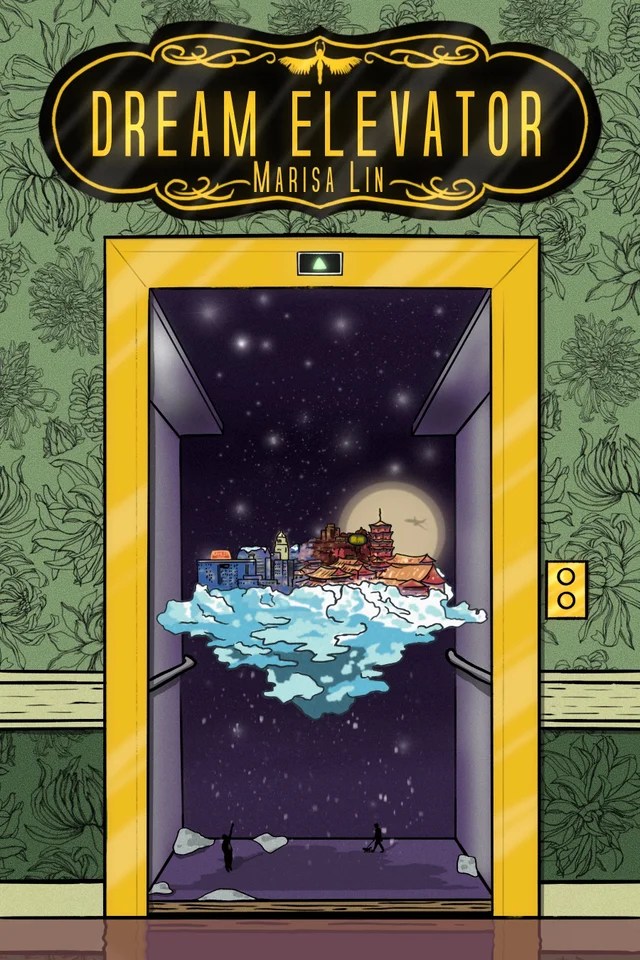
Of all our wonderful and slightly un-universal definitions we have for poetry, perhaps the one most present and pressing to our twenty-first-century imaginations is that poetry, by its mere existence, is an attempt to reckon with movement—its nature, reasons, and consequences.
In Marisa Lin’s first chapbook Dream Elevator,a title that invokes both physical and psychic movement, movement is the ghost that knocks over vases, but then picks them up and glues the colorful pieces back together afterward—of course, the pieces can never be glued back exactly how they were, and what results are poems as illuminated and surprising as they are haunting. For example, in the poem “Flame,” whose formal haunting through the use of footnotes is reminiscent of Ocean Vuong and Sean Hill, two poets whose works are also occupied with movement, lines like “Gliding by, a train ferrying passengers made ghosts by / the rapidness of thought” demonstrate a speaker both inside and surrounded by movement. The form works wonders here, as the eyes must jump between the ultra-sparse main body of the poem and the text-heavy footnotes, and movement becomes meaning-making.
The poem that follows “Flame” in the chapbook is perhaps my favorite poem not only in this collection, but one of my favorite poems that I have read this year. “Hiking with Mother, Meadow Trail” illustrates Lin’s poetry at its most resonant—the piece’s characteristic obsession with movement does not lead to a work bloated in scale or burdened with intellectual dread, but instead to work intent on the small and shifting, and open to rapid changes of perception. In the first lines of “Hiking with Mother, Meadow Trail” the speaker and their mother become “specks of light” who in the next line transform into “cars of flesh / driving over squirrel bones.” Imaginative movement like this follows through the course of this relatively short poem, as with moments like “In apart, an exile. In exile, a license plate.” Big to small to alive to dead to natural to artificial and back again, this poem, as with much of the collection, gives us “shifting maps, fluid skeletons” that “might lead us back, or elsewhere.” The speaker, and thus the reader, can’t set their eyes on any one thing for too long, and an idyllic meadow trail that otherwise would lean towards still-life transforms into a multi-medium collage, haunted and colorful and haunting.
It’s easy to see an impressive imagination at work when looking at the forms employed by Lin in Dream Elevator. A superficial scan of the collection reveals enough formal play and variety to impress even the most experimentally-minded: a poem in footnotes, a concrete poem in the shape of the continental United States and another in the shape of bra, a center-justified poem in triplets, left-justified couplets, prose poems, semi-prose poems, haiku—Lin embraces familiar and invented forms and shapes to study movement, to trap the collection’s ghost long enough to see how it does its work.
As its title suggests, Dream Elevator showcases poetry that explores immigration of the physical, political, and psychic kind. A tight collection of 34 pages of poetry, the chapbook is intent and unrelenting with its examination of the very real political issues that force movement, as well as the very real immigration story of Lin and her family from Quanzhou, China, to Southeastern Minnesota to Bay Area California. Yet, the collection also allows those issues and stories to transform into dream-like images and narratives, allowing Lin and us to view immigration, a topic as ancient and ever-present as trees, through a wildly imaginative, and thus, a wildingly telling lens. As a reader with a particularly imaginative bend and taste, I am curious to see what narratives Lin will apply her formal and lyrical imagination to in future collections.
In this collection, Marisa Lin has established her voice in a long line of poets reckoning with movement. Yet, her eclectic explorations in Dream Elevator bring that long-established conversation into the generation of the now. The world is becoming more eclectic, more many, more mobile, and more unsure of the “elsewhere” to which this movement leads us. Lin’s Dream Elevator is an exciting attempt to supply a “shifting map” of our world for one speaker and for many of us.
Dream Elevator, by Marisa Lin. Hamilton, New York: KERNPUNKT Press, March 2024. $14.99, chapbook.
Nathan D. Metz (he/his) is a writer living in the Bay Area of California. His work has been featured or is forthcoming in Autofocus, Phantom Kangaroo, The Racket, Moon City Review, and elsewhere. A Pushcart nominee, he has received scholarships/fellowships from the Elk River Writers Workshop, Canterbury Program, and the AHA. He loves poetry and he loves you.
Check out HFR’s book catalog, publicity list, submission manager, and buy merch from our Spring store. Follow us on Instagram and YouTube. Disclosure: HFR is an affiliate of Bookshop.org and we will earn a commission if you click through and make a purchase. Sales from Bookshop.org help support independent bookstores and small presses.

Leave a comment